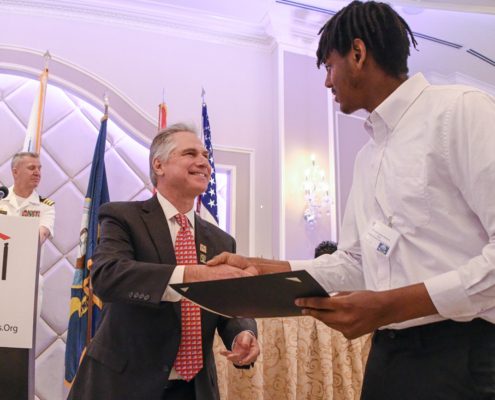By Larry Jasper, National Editor
Meet the current Department of Minnesota Commander Stewart Mednick. When asked why he joined JWV, he says his friend, Peter Nickitas (current National Judge Advocate), invited him to join. Like so many others, until that time he had never heard of JWV.
Mednick is a Chicago native. He lost his father while a high school senior and that had a profound impact on his life. His plans for college took a back seat as he had to work to help his family. He finally started Junior College majoring in music and after 3 semesters transferred to the Chicago Conservatory of Music where he earned a full scholarship in music.
While at the Conservatory, he recorded his compositions and gained an appreciation for studio work. This led him to decide to shift his focus to Recording Engineering. He then transferred to Ball State University and realized that he needed additional courses, so his 4-year degree program became 7 years of study.
At the age of 23, Mednick was married with one child and decided to begin his military career in the Navy. He trained in electronics. He served on subs specializing in inertial navigation, satellite navigation, and missile guidance systems. He served multiple deployments and was assigned to the Weapons Department Quality Assurance where he qualified as a Chief Inspector and was in charge of missile transfers to the subs from the tender armory. He was later stationed in Minnesota where he decided to stay after discharge.
Mednick’s awards included Admiral’s Letters of Commendation, Navy Achievement Medals, Minnesota Governor’s Certificate of Commendation, and sixty various qualifications that includes the Submarine Warfare Qualification pin known as “The Dolphins.”
Post military Mednick worked at a refinery job for about 5 years during which time he finished his degree and then an MBA in Financial and Strategy.
In 2007, Mednick felt a call to help his fellow veterans and left finance to become a County Veterans Service Officer (CVSO) in Hennepin County, Minnesota, home to over 70,000 veterans.
His work as a CVSO evolved into working with veterans with mental health issues and eventually started a court diversion program in Minnesota. He was the only VSO to receive a Leadership Award for his work.
This experience led him to Hewlett Packard Enterprise Services, the largest government technology contractor in the United States. He participated in the pilot program for the Veterans Administration’s Virtual Lifetime Electronic Record Program, then digitizing DD-214s, and biometrics for facial, fingerprint, and retinal scanning.
Mednick currently works as an independent technology consultant, specializing in Business Analysis, Program Management, Requirement Engineering, and on digital enhancement and application integration and testing.
Since joining JWV as a life member, he served as Post 354 Commander, Department of Minnesota Vice Commander, and now as Department Commander. His goal is to work for better community relations. Currently, he is working with other Veteran Organizations in Minnesota and the Minnesota Department of Veterans Affairs. He was instrumental in getting a few hundred sets of sweats for the Minnesota Veterans Home. He is currently planning a dinner for clergy and Jewish community leaders to introduce JWV to the greater Jewish community.
Mednick has been married to his wife, DuAnne, for 40 years and has three children and four grandchildren. His son served in the Army National Guard and deployed to Iraq for 16 months.
Quite an accomplished life!
Volume 78. Number 1. 2024
 serve as an Army officer.
serve as an Army officer.
